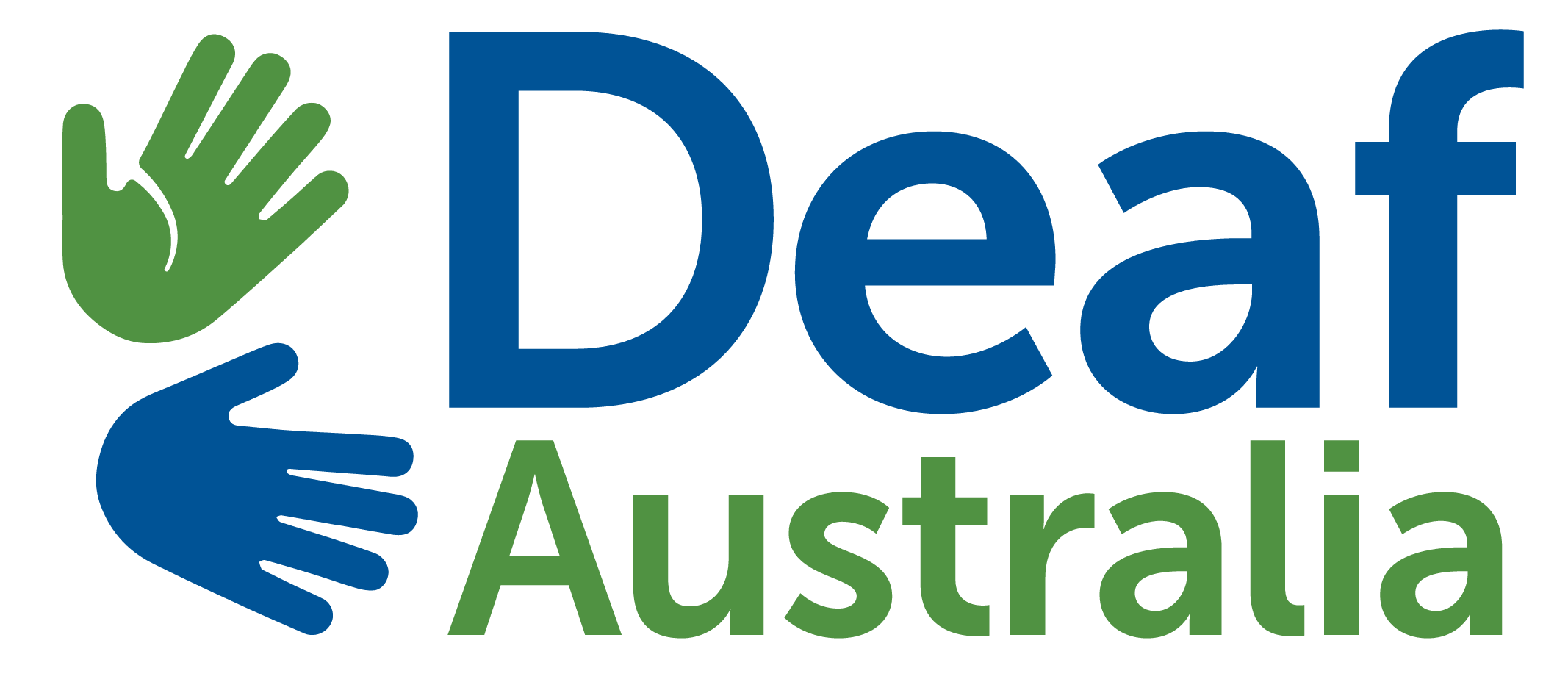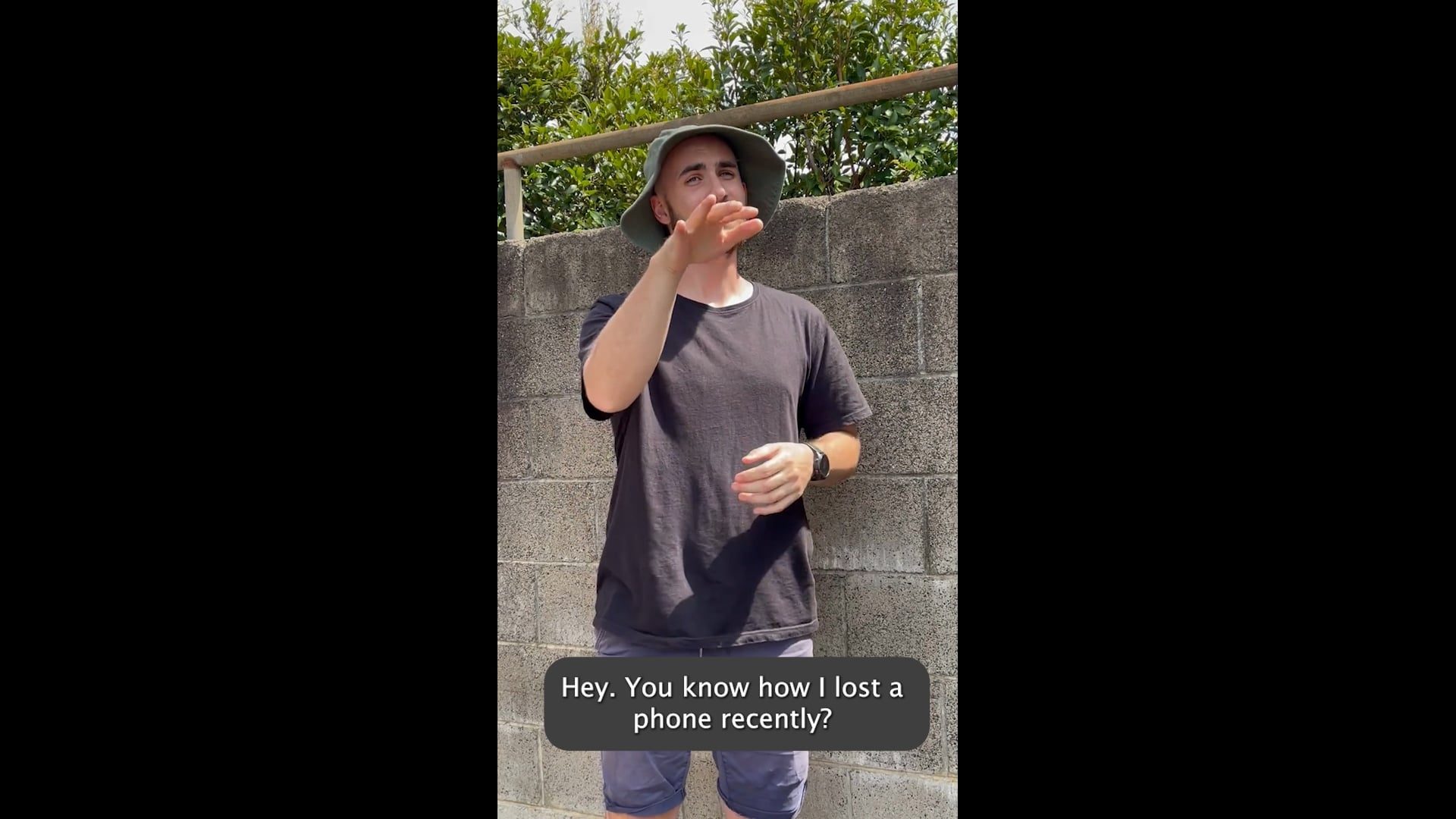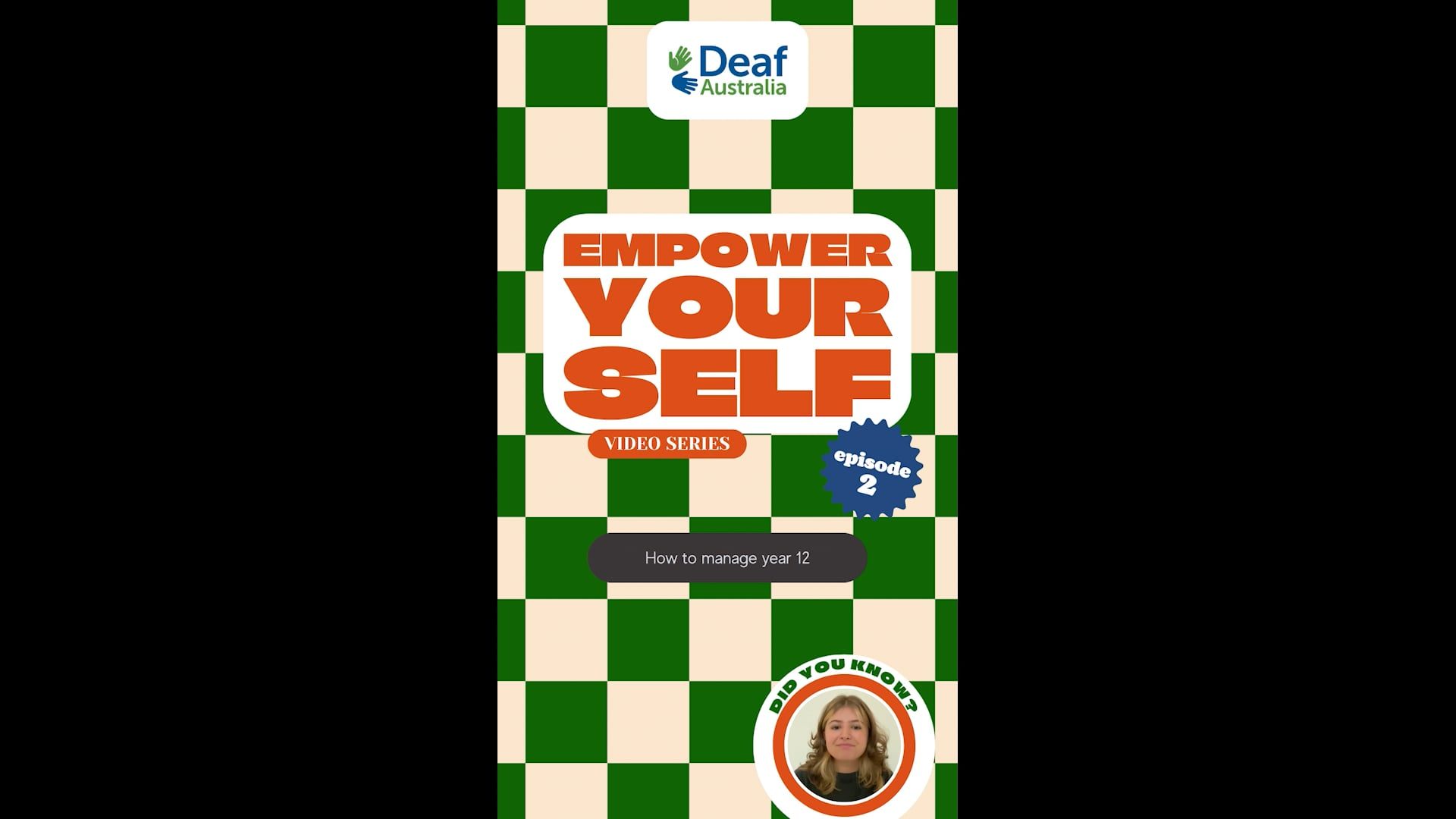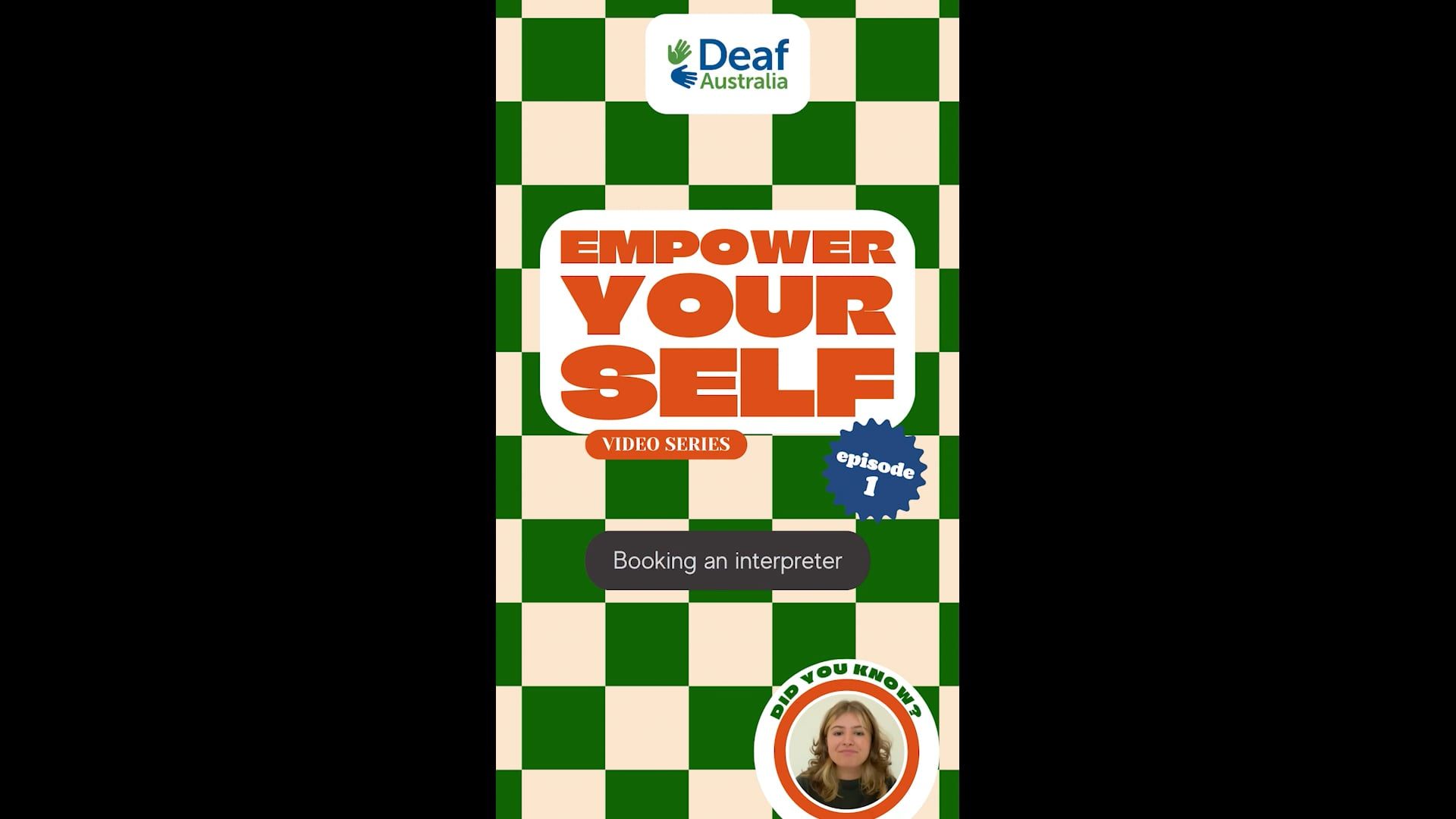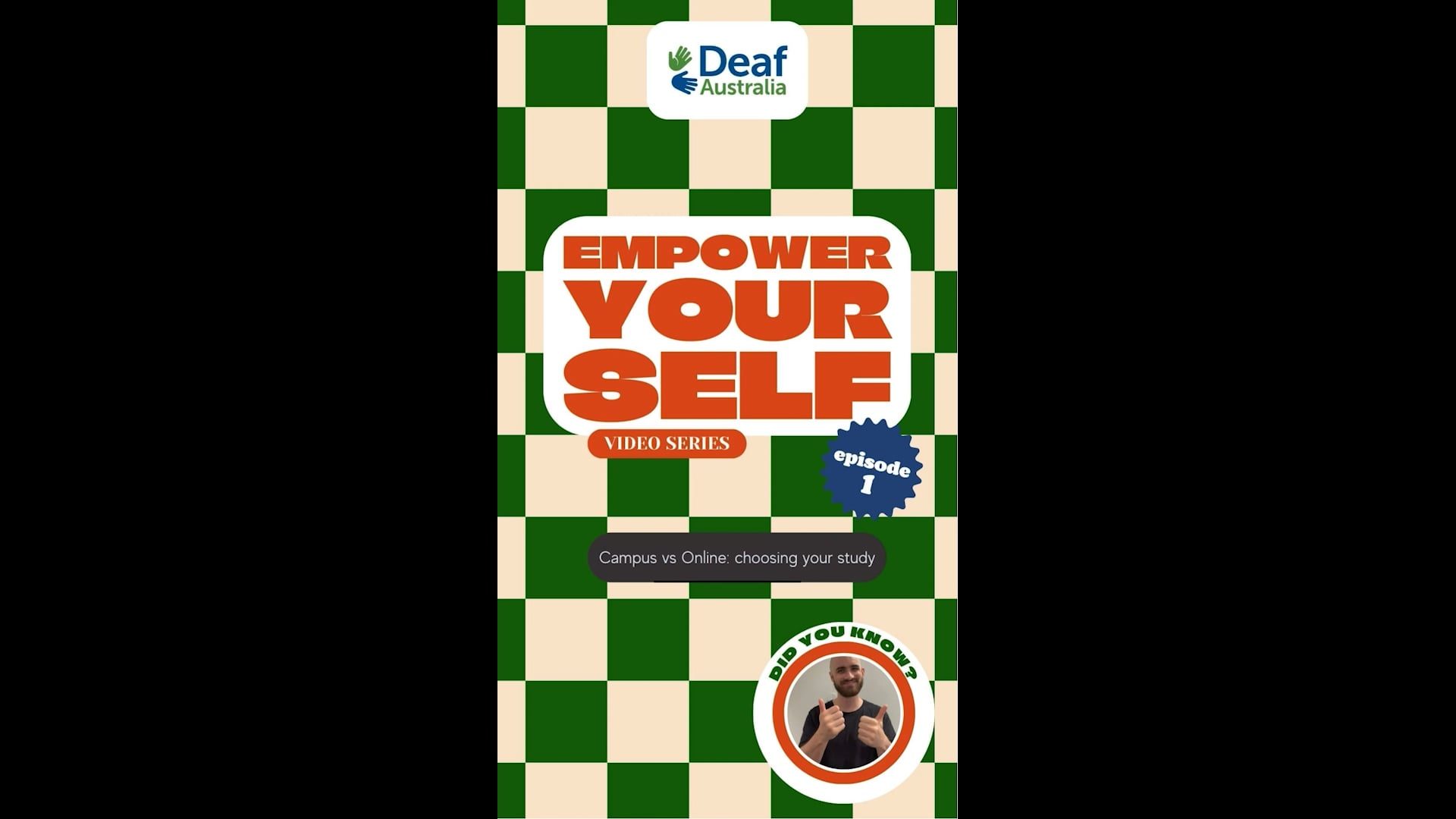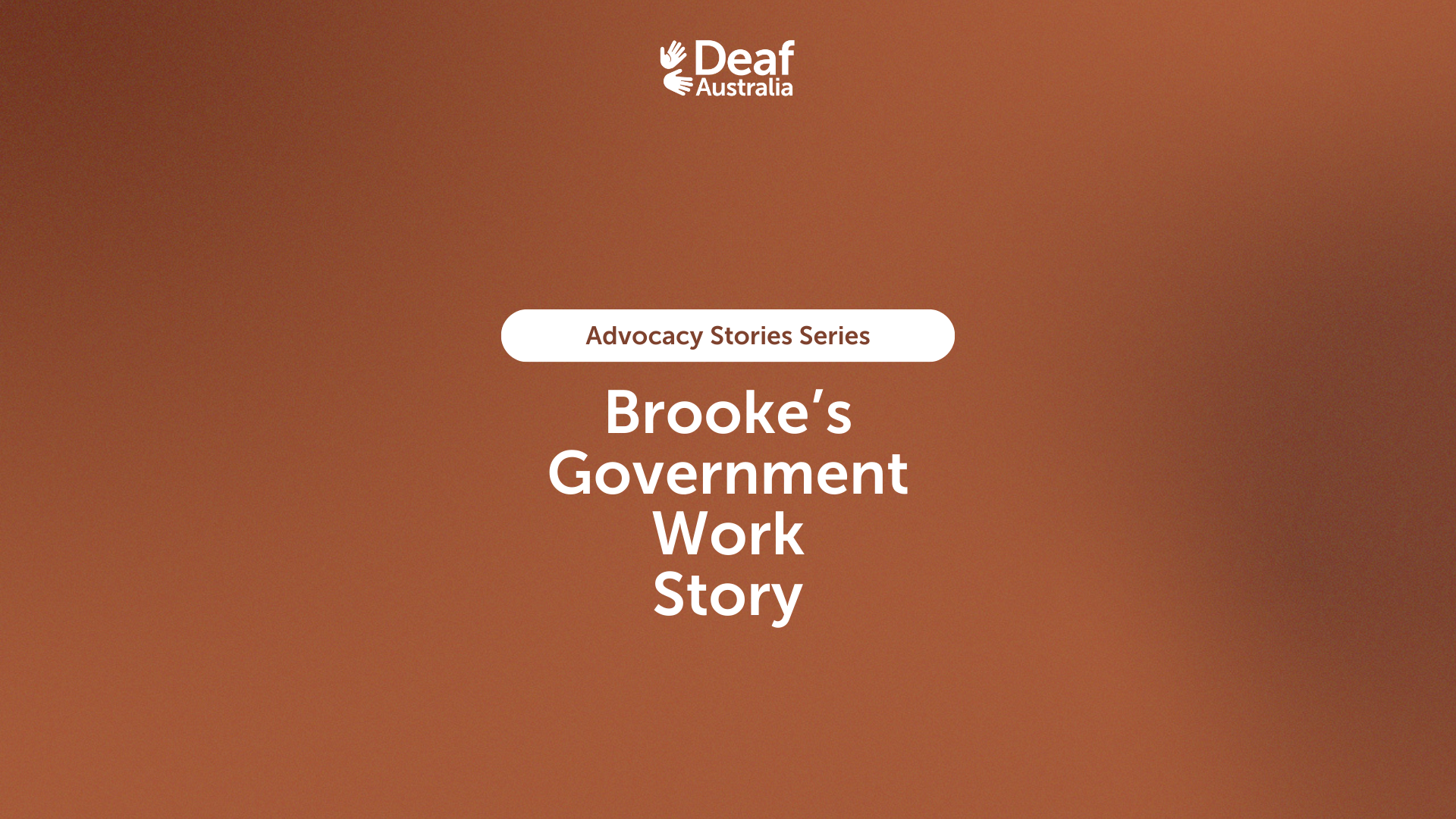No products in the cart.
30/07/2024
Jen Blyth’s Update – 30 July 2024
Transcript
Hello, I’m Jen Blyth, CEO of Deaf Australia. I wanted to provide with you an update.
I’ve worked at Deaf Australia for the past 3 years. It has truly been an amazing experience to work with the Australian Deaf community across the country. This includes the Deaf, Deafblind, Hard of Hearing and Deaf and Disabled communities all over Australia. Building relationships with you all, including the First Nations Mob in Far North Queensland, with young Deaf people, the older Deaf community and everyone in between across the country. Also the many collaborations with various organisations, businesses, small businesses and a range of people and groups over the last 3 years.
In that time, we have achieved many things, including being a witness at the Disability Royal Commission, the Deaf Census, which is now available, E-learning training packages, multiple policies and submissions made, and partnering with organisations such as Deaf Connect for the Parliament Breakfast. There have been many achievements in the last 3 years, a long list, and that was all possible because of the wonderful team I’ve had with me here at Deaf Australia. I couldn’t have done my job without them. They are incredible. Also, Thank you to the Deaf community of Australia. Your feedback, both positive and negative has helped guide me and Deaf Australia to achieve many things. So thank you so much.
So earlier this year, in January I was presented with an opportunity to go overseas to the Solomon Islands to work with another Disability organisation there, and with the Solomon Island Deaf Community. I consulted with the Board, as I have the skills and experience that I can contribute as well as the desire to share with our Pacific neighbours. As the Solomon Islands are part of the WFD Oceania region. The Board approved my request, and I went to the Solomon Islands. I was away from February until June. I returned to Melbourne where the Board and I agreed that it was time to go our separate ways.
The Board will be looking ahead at things they can look to achieve with a new CEO. And I am going to follow my own path and do my own thing. I’m still around, I still welcome you all to contact me at any time. Also, you can still contact Deaf Australia too. As you know from the recent update, the team at Deaf Australia has reduced in size. For now, please understand that Deaf Australia and the board will be considering its future plans and how it will continue to achieve its outcomes for Deaf Community going forward.
I’m not going anywhere, I’m still living here in Melbourne, please reach out to me anytime.
Thank you and Goodbye.
16/07/2024
Special General Meeting Notice
Transcript
Hello all. Deaf Australia will have its 37th Annual General Meeting on Saturday 18th November 2023 at 2PM Sydney/Melbourne time. Our AGM will be at Meat Market in North Melbourne. We will utilise a hybrid model, which means the AGM will be in person and live streamed online. Please register for the AGM so we can organise catering for those who will be attending in person.
There are some important information related to voting at the AGM.
Our new Constitution with big changes eg. length of membership becoming annual not lifetime. Please make sure you read the proposed new Constitution prior to the AGM. You will get a copy of the new Constitution along with this Notice.
Deaf Australia plans to change from an incorporated association to Company Limited by Guarantee. The change needs to be voted by members.
Board nominations as there are three positions available. If you are interested in joining the Deaf Australia Board, please send your nomination form by Sunday 5th November 2023.
If you are unable to attend our AGM but would like to vote, please send your Proxy and Apology form by Sunday 12th November 2023.
If you have any items to be added to the Agenda, please email our CEO by Sunday 5th November 2023. The email address is [email protected].
During the AGM, we will also present three awards: Deaf Australian of the Year, Deaf Youth Australian of the Year, and Community Volunteer of the Year.
Deaf Australia will also facilitate a Q&A evening on Friday 17th November 2023, the day before our AGM. This is to give you an opportunity to get clarification or ask questions about our new Constitution. More information will be shared soon. Hope to see you there!
Attachments
Letter from Chairperson
Dear Members,
We are writing to inform you of a Special General Meeting that has been called by the Board of Deaf Australia. The purpose of this meeting is to vote on several important matters that will shape the future of our organisation.
Date: Thursday, 15th August
Time: 7:00 PM AEST
Location: Zoom
Agenda:
1. Vote on a special resolution to update the constitution of Deaf Australia
2. Consider a name change for the organization
3. Amendment to the 37th Annual General Meeting
4. Appointment of Prolegis Lawyers to oversee the process of applying on behalf of Deaf Australia
Please see the attached letter for detailed information regarding the Special General Meeting and the proposed updates to the constitution.
Your participation and input are crucial to the decision-making process, and we encourage all members to attend this meeting. Please mark your calendars and make every effort to register and join us on the specified date and time.
You can register and join the meeting by Zoom by using this link.
If you have any questions or require additional information, please do not hesitate to contact us at [email protected]
Thank you for your continued support and dedication to Deaf Australia.
Sincerely,
Debra Swann
Chairperson
Deaf Australia
28/06/2024
Thank You From Shirley
Transcript
Hello! I’m Shirley, the Acting CEO.
I wanted to provide you with this video because today is the 28th of June. It’s a big day for us because most of our staff are busy wrapping up their projects as their roles are ending today. It’s not everyone, a couple of people are continuing at DA.
Overall, we wanted to say a big thank you to you all. All the staff agree that we want to recognise you all, either as individuals, deaf organisations and businesses, our partners and allies. All of this has been a massive support to us and our work for the past few years. It’s been incredibly valuable. Thank you.
Also I, myself, really appreciate those of you who took the time to check in with our staff after they saw the news about the impact on funding, which was unfortunate and sad. To make sure they felt supported through a restructure of their future plans. Really big thanks to those who recognise that we we are also a part of the deaf community and provide support to each other during a hard time or life’s ups and downs. We really appreciate that.
Yes, Jen our CEO, will be back to work starting next week. But as the board announced recently her role will be reduced to part time. Also, we still have a few advocacy initiatives ongoing ensure a fair and equitable access for the deaf community. Keep an eye on our social media to follow and continue supporting our work. We are really excited to show some opportunities coming up soon. Yes, this group of staff was fantastic to have as support through difficult time and we know they will have our deaf community support moving forward and stay connected. Thanks to you all and thanks to the board for their support through this difficult time as well. Have a good weekend! Bye.
Visual description
Shirley is wearing a black shirt and standing in front of a plain beige wall. Her hair is pulled back into a bun. She is signing in a professional, friendly, and slightly bittersweet way that is appropriate to the tone of the content.
27/06/2024
Strategic Planning Update from Board – Filmed 9 June 2024
Transcript and visual descriptions
Debra
Visual description: A woman with dark coloured shoulder length hair, in a blue three-quarter sleeve blouse, with a tattoo on her right hand, is standing against a light charcoal coloured wall, facing the camera, communicating in Auslan.
Deaf Australia has had a productive two days. On Friday we had the Board and staff come together to reflect and celebrate our achievements, and look ahead to the future of Deaf Australia. On Saturday the Board gathered to talk through the vision, goals and purpose of Deaf Australia. Here are some thoughts from Board members about our strategic planning weekend.
Sherrie
Visual description: A person with short dark coloured hair, wearing circle shaped glasses, in a green t-shirt with a printed image of their sign name, is standing against a light charcoal coloured wall, facing the camera, communicating in Auslan.
The last two days have been exciting. Plenty of seeds that will be spread throughout our community and as a result we will see individuals in our community thrive.
Susan
Visual description: A woman with short curly light-black coloured hair, wearing rectangle shaped glasses, in a navy woollen jumper, is standing against a light charcoal coloured wall, facing the camera, communicating in Auslan.
Over the weekend what stood out for me was the growth of Deaf Australia from just advocacy into other initiatives. Incredible.
Joanna
Visual description: A woman with long curly light coloured hair, wearing circle shaped glasses, in a black top, with large yellow and red shaped earings, is standing against a light charcoal coloured wall, facing the camera, communicating in Auslan.
Over the two days what I witnessed was the different changes being made. I am so excited to see Deaf Australia and the deaf community working together, for future success and growth. I am so excited.
Julie
Visual description: A woman with dark coloured hair tied behind her head, wearing rectangle shaped glasses, in a dark coloured t-shirt, is standing against a light charcoal coloured wall, facing the camera, communicating in Auslan.
Our strategic planning session was full of detailed conversation where we developed new goals within three areas. Are you wanting to know more details? Well, we will be sharing more information with you all soon.
Debra
Visual description: A woman with dark coloured shoulder length hair, in a blue three-quarter sleeve blouse, with a tattoo on her right hand, is standing against a light charcoal coloured wall, facing the camera, communicating in Auslan.
What an amazing weekend. The Deaf Australia Board now will be working hard to prepare and present, with feedback from you the deaf community, a plan that meets the needs of our community.
26/06/2024
Online Scam – Buying Via Marketplace – Dylan Episode 2
Transcript
A – Hey. You know how I lost a phone recently? Yeah. I’ve been looking in Facebook’s Marketplace. I found a really good one that I want to buy. I’ve been in contact with the seller then we confirmed last night, and I’ve paid online. Today the contact disappeared. I feel like I have been scammed because my money was stolen.
B – Yeah. Unfortunately, online scams are increasing and becoming more widespread. It’s getting worse, not only in Australia but globally. I understand how you feel.
A – So what do I do?
B – If you got scammed, you can report it to the website called scamwatch.gov.au. It’s a great website because if you report scams, it helps the government and police to catch more scammers otherwise they will continue happening. So please report and help to prevent the issue! What kind of scam reporting? There are plenty of options you can select on the website. Phone stolen? There is an option for that.
A – Great, I will report. But I still need my phone!
B – Yeah right, I understand you still need your phone. You can try contacting your bank and letting them know that it was a scam and sometimes it is possible for them to refund you. So onwards, if you want to buy a second-hand phone, it is the most ideal to buy face-to-face. That way you know for sure. You can buy through cash, without any mess. Online is not secure.
A – Good. I will contact my bank and let them know that I was scammed. Hope they will refund me!
B – Don’t stress about it too much! It’s very understandable because scams nowadays are so advanced that it’s hard to tell. Sometimes it doesn’t even look like one. It’s everywhere. Hey, I wonder if that seller sent you a link?
A – Yeah they sent me a link and I clicked on it! What about it?
B – That’s bad! Most often these links are for the scammers to get access to your account. Best if you change your password now. Also ideal if you set up 2FA. Do you have it?
A – 2FA? What’s that?
B – Ah yes 2FA means Two Factor Authentication. So once you log in, you will be sent a code by Facebook which you need to put in before fully accessing your account. So if a scammer tries to log in, it won’t work because they don’t have your phone or number! 2FA is great because it’s very secure. It’s worth setting up.
A – Pah! Thank you for explaining, I understand now.
26/06/2024
How to Manage Year 12 – Maya Episode 2
Transcript
Hello, I am Maya and I am currently in year 11 in High School, here in Victoria. Next year I will be in year 12, very exciting but as you all know, year 12 can be very overwhelming with the content and hard to balance your social life with school commitments. I’ve had a bit of research and looked into the three best advices, that I will be sharing with you all, so you are able to learn how to manage year 12 as well! I think the most important tip would be the first one, and I urge you to try and achieve this. In Victoria, we have VCE and/or VET, and you need six subjects all together to complete year 12, so I pulled, not only one, but two subjects earlier. Meaning in year 10 I finished a subject and I will be finishing one this year too, so next year I will have not six, not five, but four subjects to focus on and it will be easier for me to manage my routine within school and social life, that is why I urge you all to try this. Tip number two, remember that you are not alone, have a chat with your friends about how you’re feeling and if you’re behind on the schoolwork. You both can help each other out and you both could go to a library together and study together there and afterwards, go your separate ways home. Make sure that you pick the right friend! So you both wouldn’t be chatting away the whole time and ignoring the work! Tip number three, you can talk to your teachers, or your support group by emailing them or having a discussion face-to-face, saying “I feel that I can’t catch up with the class work or understand it very well.”. Most of the time your teacher will be supportive and try help you out by giving you extra information, extra time or sitting down with you and having a chat to make sure that you can understand as much as possible. Especially because your education/learning is important.
26/06/2024
How to Book an Interpreter – Maya Episode 1
Transcript
Maya: You know how I have a meeting coming up soon? Maybe this is a good time for you to teach me how to book an interpreter for the meeting.
Nat: There are several booking agencies in Australia, including examples like Expression Australia and Deaf Connect, varying in size from smaller operations to larger ones. You can go on their website or google and find the link to book an interpreter from there.
Maya: Ah yeah, but, I would love to book a specific interpreter. How can I do that, do I ask the agency or is there another way?
Nat: I know what you mean, it’s great to have an interpreter that you understand very well, you could tell the agency your preference to have that interpreter and a couple of others and they will try and contact those interpreters. If they are unavailable, the agency will give you a couple of other interpreters that are just as good. Or if you have their phone number, you can contact them and ask to book them directly, from there you can negotiate prices and ensure that it is reasonable. But if the interpreter calls in sick or pulls out, you have to find another interpreter and may not be able to fine one in time. While the agency will keep looking for you and have higher chances of finding a replacement for you. Each has its pros and cons.
Maya: Aha, I got it! Thank you.
26/06/2024
Campus vs Online – Choosing Your Study – Dylan Episode 1
Transcript
Hello. I’m a university student, and I’ve studied both on-site and online.
Both were great experiences and I thought I’d share with you the two different methods in case you’re considering undertaking university studies and are unsure what to expect.
Six years ago, I began my Uni studies on campus, I attended lectures with Auslan Interpreters as well as interpreters in the classrooms. It was great, I liked the approach and access but unfortunately, the subjects I had chosen weren’t right for me so I withdrew.
After some time had passed, I recently decided to enrol in uni again, however, this time the course was delivered online. Being Deaf I thought I had to study onsite, that face-to-face learning was a must. However, I decided to give online a go and it was brilliant!
I still had an interpreter for the online classes on Zoom, plus the platform also had live captioning! It was perfect, I was able to get a bilingual education, having the Auslan interpreters on my screen as well as the English captioning! It was great! Also, I didn’t have to worry about staring at the interpreters tirelessly as I knew I would get a copy of the transcript. Not only a copy, but the service would also fix any errors that the captioning may have made from the lecturer’s presentation, providing me with an accurate transcript of the lesson! It was a great way to learn.
For those who think Deaf people must study in person, I want to put it out there that it can be flexible! When you enrol in a university, you can reach out to their accessibility team and discuss your accessibility needs and what you require to undergo your study. Including requesting interpreters you know and prefer, live captioning and what their services offer. There are lots of flexible options!
26/06/2024
Brooke’s Government Work Story | Advocacy Series May 2024
Transcript
Hi, my name is Brooke Pape, this is my sign name. I’m from Canberra.
At the moment, I work three jobs. The first one is in Australian Government Public Service, I also teach Auslan at TAFE and for community courses, and provide disability support for deaf clients. The first job I got was full-time in 2019. Within a month of starting, all staff were required to attend an induction course.
I enrolled, submitted my paperwork. I contacted the facilitator and requested reasonable adjustment: they provide an Auslan interpreter. That was acknowledged, and things went ahead. Two weeks later, I was removed from the course enrolment list. I contacted the manager to clarify what was going on. The manager contacted the course facilitator, and found out that they believed the Auslan interpreter would be a distraction for other course participants. I was shocked, the manager was furious and shocked. He “flipped the table”. There was already discrimination at my new job in less than a month. This was unexpected, I was not prepared at all. But thankfully I had a supportive team; they learnt Auslan for me. We would do a ‘sign of the week’ to practice, we’d chat at lunch, do a lot of things together. We still keep in touch, do Christmas visits.
Unfortunately, in Government work, there are always restructuring. Which meant I lost my team. I had to start all over again with the new team, teaching them deaf awareness, about deaf culture, sign language, Auslan interpreters. Canberra’s pool of interpreters is very small; there is only one level-3 Auslan interpreter and she’s half-retired. She isn’t the best fit for my needs; she’s not bad at all! It’s just my needs are different. I prefer level-3 interpreters from Sydney. The level-2 interpreters in Canberra are not suited for Government work and would not reflect my literacy skills properly.
There was a lot of ongoing dispute. I said I needed Auslan interpreters for meetings, training, which they refused. In ACT, there is a language policy that states providing interpreters is a requirement. But because my government workplace is federal, the state policy didn’t apply. My work is in procurement, we obtain services and provide them for all of Australia or our own staff. We’re very adept at knowing how to spend your money. To procure a service, there are three companies to look at, with the stakeholder’s objective in mind. Having a level-3 interpreter was my objective. Choosing services from three companies is how procurement normally happens, as dictated by policy.
But the disability inclusion team said ‘value for money’ is the objective, to look for the cheapest cost-effective approaches, which is wrong. The law we all have to follow states ‘value for money’ depends on the stakeholder’s objective. They refused to budge. We summoned an occupational therapist, because every new staff is required to comply to WHS standards in their workplace. They acknowledged my being profoundly deaf and needing level-3 interpreters. They knew I could speak and lipread but still needed level-3 interpreters for meetings and training. They already provided their letter of support, but that letter was ignored. I’ve shown them the letter many times, as well as NSW’s Disability Inclusion Access Plan. They ignored that too. This went on for three years.
I got the job through Disability Employment Service (DES). I enrolled and got in that way. That meant they knew I would need reasonable adjustment and they’d need to budget to ensure equity across the workplace. They knew but didn’t follow through. Remember, the constant team restructuring due to MOG- Machinery of Government, meaning the changing structure depends on the Prime Minister’s instructions. So our department underwent changes, and I had to repeat the deaf awareness process every time. After my supportive team was moved away, I’ve never had a team that was the same, they were never understanding or supportive. It was so bad that one of my bosses was angry at me for my Disability Employment Service person contacting her; that process was a required part of the contract the department had signed.
Because we had a bit of an issue; my supervisor and I constantly had communication breakdowns, which frustrated me. They made mistakes when training me through something and blamed me for it. There was evidence in the emails to indicate otherwise! We both met with the upper boss; this was last minute; I was not aware of the serious nature of the meeting. I would have arranged to have an interpreter and a support person otherwise to share my position, that’s only fair. They said I must have the knowledge and skill to be able to read the SOP (Standard of Procedure). There’s a lot to read with heavy English. I requested for it to be translated into Auslan; they refused and said “at your level in the Public Service, you should have the skills, if you don’t, you should be demoted.”
I was taken aback and hurt. They also had an issue with me, thinking I had deliberately contacted external agencies for additional support. But she apparently didn’t know about the DES person I was working with. That was part of the handover, I had already asked the old boss to clarify what was in the handover, they said the handover included all the necessary details and paperwork. The boss yelled at me in front of everyone, in an open-floor office space with more than 50 staff. I was sitting, she was standing, I was already feeling intimidated. It was awful. After that, I took 3 months off work without pay. I was feeling uneasy and lost, I didn’t know what to do. I felt like I could leave the job and focus on my other jobs. I loved teaching Auslan and advocating and supporting the Deaf community. But I did get that job like that after just one interview, and into a high job level. Other Canberra deaf people had tried for the job many times with no success. I felt that-
My mantra is ‘everything happens for a reason’. I felt like I was put into that job position for a reason. It was my duty to make positive changes that can have an impact on the Deaf community in a positive way. That was what made me stay. After three months of leave, I had lots of therapy, and visited many friends outside of Canberra; I didn’t have many friends in Canberra. I got my ‘deaf boost’ and felt better and ready to head back. Once again, there was another restructure, I thought ‘good!’ That boss would be moved elsewhere, and hoped the new allocated team would be better. The new team was nice but not proactive. They said all the right things but did not follow them up with the right actions.
I said I found a loophole for getting an interpreter without causing budget issues by procuring an interpreter on the panel. That way we don’t have to justify why we picked that company, because they’re already on the approved list of businesses. For example, in public estimate, one could ask the government why they’re spending a lot of money on interpreters from Sydney instead of local interpreters. There’s nothing to protect us, the deaf community, from these questions motivated by finding more cost-effective approaches, like insisting on local interpreters rather than interstate interpreters.
That made me realise, on the issue of finding compatible interpreters, there’s nothing to protect people like me who deserve a higher standard of interpreting. Canberra is too small to enable that, local interpreters are not to blame, we don’t have the resources, fundings, the skill to upskill Auslan interpreters. We need more deaf people to move to Canberra so the deaf community here can grow. It’s literally like living in a rural country. It felt like a big responsibility to shoulder, I didn’t want to give up and lose the opportunity to create positive change on a federal level for the deaf community and all of Australia at the same time.
So I stuck with it for 3 years. During a 1-2 year period, I went through a lot of bullying and discrimination until now. Unfortunately, I had to deal with sexual harassment. Because the workplace didn’t provide an interpreter, so I had to rely heavily on one staff. The boundaries were loose, I didn’t know what was expected in a professional relationship, what was normal and what wasn’t. I come from a dysfunctional family so I did not have the opportunity to acquire a natural sense of social rights and wrongs. Most people have that. I grew up without a father and didn’t have a role model. It was a slow sly change; after one year, until the last thing happened, I realised ‘this is wrong’. I submitted a report to the supervisor, he was shocked and felt guilty. He knew he neglected me and apologised. He took accountability, which in itself says a lot. I had to provide a formal statement for our internal investigation team, it was part of the mandatory reporting process, I didn’t want to do it but I had to. Because I told the supervisor, the supervisor is required to inform the team so that they can interview me. I was really nervous. They asked me for a statement, I didn’t know where to start so I asked for help. My English is good but I’m not confident enough to write what I want down. They offered me some questions. It was still difficult but I was also dealing with trauma and anxiety. I hadn’t fully processed what happened too. I posted on Facebook, asking for someone with strong English skills and can sign as well. I didn’t feel comfortable speaking. Sometimes I might feel more comfortable speaking, sometimes signing, and even writing. So I needed someone who could do all three. After a long period of searching, I had a deaf interpreter help out. They were a big help, yes, but I should have several other people to check and not completely rely on the one person. Boundaries are different for interpreters; the deaf interpreter has to write down what I say. I should have checked with other people who could give me feedback, e.g. ‘you should not say that!’ ‘You need to talk more about your feelings’. I’m well known for not talking about feelings. I often focus on being factual.
Because they told me to be factual and not emotive. But I didn’t know that with psychological injury, you have to talk about your emotions and how it’s impacted you. I didn’t know that they hid that from me. If that’s because I didn’t have accessibility or family to provide guidance and general knowledge other people have. I did two interviews and a statement and submitted them. In the end, people said they remembered things differently. I was shocked. But they did say they were happy to organise for the head of department, secretary, and a disability commissioner, and other higher up people to meet with me to talk about accessibility. I was interested in that. But someone recommended that-
They said sue the company. Woah, I didn’t ask for your advice, I don’t want your opinion, I want you to do your job. “I’ve worked on many work comp cases, you have a big case here. You dealt with a lot, having to take 3 months off. And then 6 months, and now 1.5 years without pay.” I’m now in financial hardship. My life is on hold. I can’t study, I can’t enjoy being me because I’m so scared of socialising with hearing people again. I’m scared of socialising with men again, because I thought in a higher government place, everyone must be professional. With a big age gap like that, I thought it impossible, he couldn’t see me as something sexual. And that shocked me. I’m his children’s age.
So now I’ve submitted a statement for worker’s comp. I’m waiting to find out if it’ll be going ahead as a case or not. They’re hoping at the end of all this that-
Australian Public Service Commissioner to make it standard practice that all deaf and HoH staff have access to interpreters regardless of financial costs, and have a deaf interpreter translate the annual mandatory training so it can be reused. If the training is updated, that shouldn’t matter, it should still be translated.
When I decided to sue, the first step in the process was to see the GP for a medical certificate for work leave. I contacted Comcare, a worker’s comp insurance company. I don’t know if it’s the same across Australia but I think this company is for Australian Public Service or maybe only under my department. I’m not sure. I contacted them and they asked me to give them a formal statement. I gave them that. They asked me to get a medical individual assessment, I did this only last week. I was nervous because unfortunately I had a difficult experience with one of the people. I’ve been through a MVA (motor vehicle accident), this person delved deeply into my past, attempted to blame me and my past trauma as the reason why I was in chronic pain, rather than the accident itself causing that.
Because of that experience, I was nervous with the next assessment. But she was lovely this time. She said we only require minimal details of the past because I was managing it, going to therapy with good results. Back then, I was really happy, I was ‘human’ and able to walk, go shopping, socialise. But now I can do none of these things anymore. She understood, and asked me when did it start. I wasn’t certain nor clear on the dates. She referred to the timeline of the statement. I haven’t received a report, I don’t know if it was successful or not. I hope it is. I feel it will have a good outcome.
My advice is that with any meeting, e.g., any verbal conversations you have with your supervisor, manager, whoever, be sure to record the date of the conversation, what was discussed, any actions, when to follow-up. Write everything down because you never know if they will sue you one day. You at least have evidence recorded over time. Also, start keeping a log of when you have anxiety attacks, when it started, when therapy started, when did you start feeling scared to leave the house, start having nightmares and sleepless nights, write them down. Because they will look back and work out the date the psychological injury starts impacting you. That was what I wished I had done.
But luckily, I had plenty of evidence, through text messages and emails, of discrimination.
